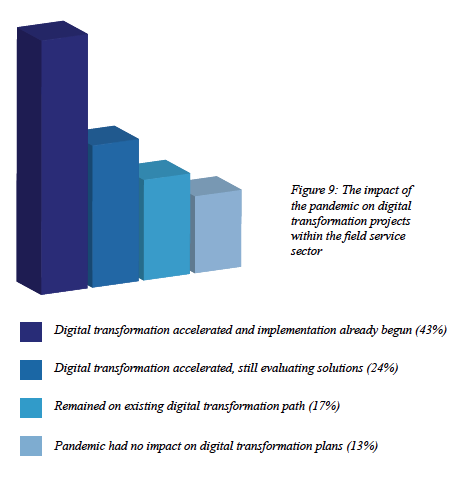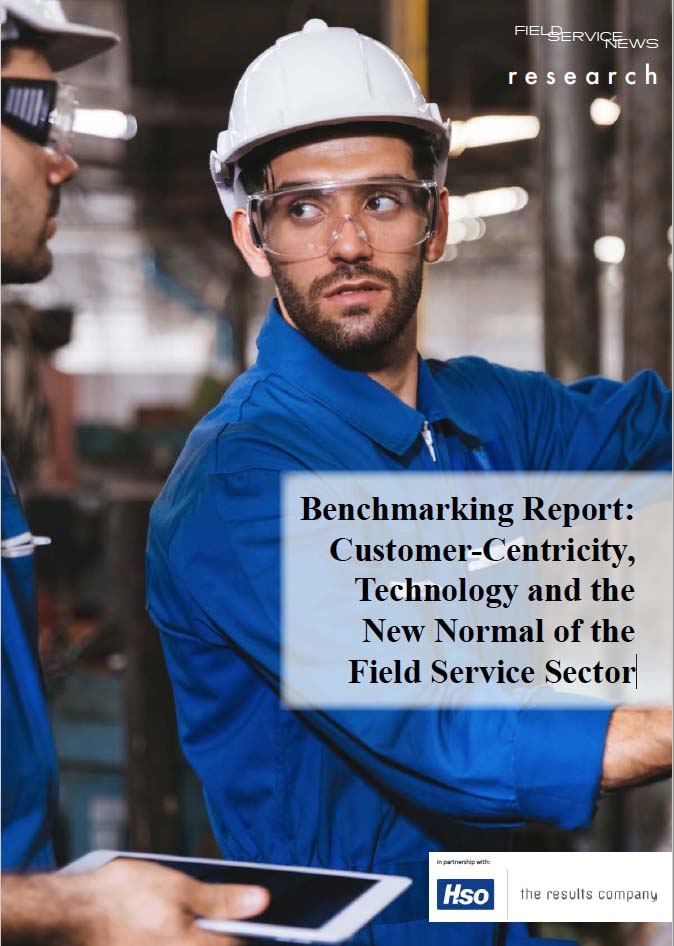Our digital transformation journey has been accelerated.
While industry-wide digital transformation was undoubtedly a journey we were already on as a sector, the impact of the pandemic has undoubtedly been an accelerator.
To measure just how significant that impact was on the field service sector, we asked our respondents if they had seen their digital transformation projects accelerated due to the pandemic.
Just under half (43%) of field service companies in the study stated that this was the case, and they had already begun implementing projects that were on their roadmap a lot sooner than anticipated. Furthermore, almost a quarter of field service companies (24%) stated that the pandemic had accelerated their digital transformation projects. However, they were still in the process of identifying the next best steps, so that their solution is fully future-proofed.

In contrast, just under a fifth of companies (17%) stated that they were already on a digital transformation path, and they have stayed on their original timeline while just over a tenth (13%) of companies stated that the pandemic had no impact on their digital transformation plans, (figure 9, above).
However, while the study data indicates that the pandemic has accelerated digital transformation for the majority of field service organisations, the impact of the pandemic has also been something of a double-edged sword.
Nearly two thirds (62%) of the field service companies within our response set admitted that meeting customer expectations has become more challenging since the pandemic. Similarly, 82% of field service companies within the study also state that ensuring customer success has even greater importance since the pandemic. Finally, we also saw the same number (82%) of field service companies stating that they believe there is now greater customer expectation for service companies to offer digital solutions such as customer portals.
Given these findings within the study data, it is of little wonder that we see improving customer experience as the single most crucial area of development field service companies are seeking within their digital transformation projects.
Just under half of all respondents (48%) stated this to be the case, although this was closely followed by operational efficiency, which 43% of companies cited.
Only 9% of companies said that their primary area of focus was driving asset productivity.
One final indicator of how the pandemic has accelerated digital transformation can be found within the expectations of results when implementing a new system or technology. Out of necessity, many field service companies reduced the administration and red tape layers around the implementation of service offerings throughout the pandemic.
The study’s findings would seem to indicate that this understanding of how quickly such projects can yield results has shifted as a result. Indeed, most field service companies within the study (42%) believe they should be able to see results from the implementation of technology within just six months. A similar amount of field service companies (41%) stated that the expected time frame was twelve months.
Such timeframes are considerably lower than one might expect, and this would certainly appear to be a result of the acceleration of digital transformation projects that the pandemic has introduced.
However, it should also be noted that this is not a static moment in time. Not only is our industry rapidly evolving but so too is the speed in which tools and apps that can support such transformation are able to be developed and ROI on technology investments has been shown to be faster than ever.
As we saw earlier in this report, a quarter of field service companies stated that their digital transformation projects had been accelerated. However, they are still in the selection phase to identify the solutions that can serve them now and in the future. Over two-thirds (69%) of the field service companies within the study stated that there is a technology they will be implementing within the next twelve months that could improve the customer service they deliver.

This content is available exclusively for FSN Premium members. Please either log-in or subscribe for access


